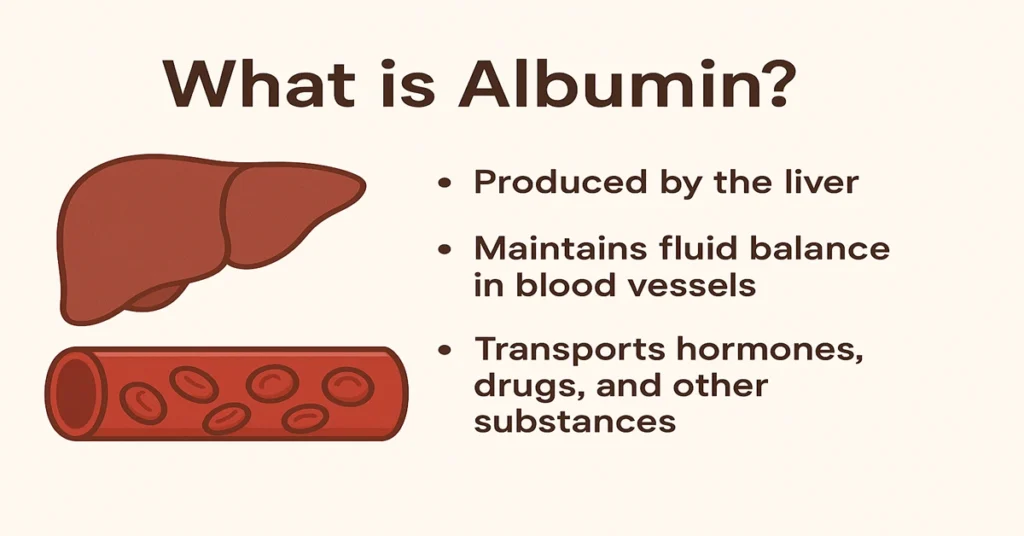Introduction
Proteins are essential for the human body, and among them, albumin is the most abundant and important. It makes up nearly 60% of the total protein in blood plasma. Because of its central role in maintaining body balance, the Albumin Test is one of the most common blood tests doctors recommend.
This test helps evaluate the health of the liver, kidneys, and nutritional status. Abnormal albumin levels may indicate conditions ranging from liver disease to malnutrition or kidney problems.
What is Albumin?
Albumin is a protein that circulates in your blood plasma. It is a water-soluble protein and is responsible for keeping body fluids balanced, transporting important substances, and acting as a reserve protein during illness.
The Albumin Test measures the concentration of albumin in blood and provides insight into your overall health.
Where is Albumin Produced in the Body?
Albumin is produced by the liver. After its production, it is released into the bloodstream, where it helps regulate many vital body processes. Because it is made in the liver, its levels are often used as a marker of liver function.
Functions and Importance of Albumin
Albumin has many crucial roles that affect almost every system of the body.
- Maintains fluid balance
- Albumin prevents leakage of fluid from blood vessels into tissues.
- Low levels can cause edema (swelling) in the legs, ankles, or face.
- Transports substances in the blood
Albumin acts as a carrier protein and helps move:- Hormones
- Drugs
- Calcium
- Fatty acids
- Bilirubin
- Acts as a protein reserve
- During illness, surgery, or injury, albumin can be broken down to supply energy and nutrients.
- Helps maintain blood pressure and pH balance
- Albumin contributes to oncotic pressure, which keeps blood circulating properly.
- It also helps maintain the acid–base balance in the body.
Causes of Low Albumin (Hypoalbuminemia)
When albumin levels drop below normal, the condition is called hypoalbuminemia. This may be caused by:
- Liver diseases such as cirrhosis, hepatitis (reduced albumin production).
- Kidney diseases like nephrotic syndrome (loss of albumin in urine).
- Malnutrition or low protein intake.
- Severe infections or inflammation.
- Digestive disorders such as Crohn’s disease or celiac disease (poor nutrient absorption).
- Burns, blood loss, or major trauma.
- Heart failure or cancer.
Symptoms of Low Albumin
Low albumin levels affect the body in different ways. Symptoms may include:
- Swelling (edema) in legs, ankles, or face.
- Fatigue or weakness due to poor nutrient transport.
- Delayed wound healing.
- Loss of appetite.
- Frequent infections because of weak immunity.
- Ascites (fluid buildup in the abdomen, especially in liver disease).
Causes of High Albumin (Hyperalbuminemia)
High albumin levels are rare. When they occur, they are usually due to concentration effects rather than excess production. Causes include:
- Dehydration (less water in blood makes albumin appear high).
- High protein intake (rarely leads to a true increase).
- Certain medications, such as steroids.
👉 Note: High albumin is usually not a disease by itself. It generally reflects an underlying condition like dehydration.
Symptoms of High Albumin
High albumin usually does not cause direct symptoms. If present, they are related to the underlying condition, such as:
- Dehydration symptoms – dry mouth, dizziness, low urine output.
Reference Range (Normal Values)
- Albumin: 3.4 to 5.4 g/dL
(Values may vary slightly depending on the laboratory.)
Since albumin makes up the major portion of total protein, its measurement is often done alongside the Total Protein Test and the Albumin/Globulin Ratio (A/G Ratio).
Sample Type and Collection
- Sample Type: Serum
- Tube Used: Red Top (Plain Tube)
No special preparation is required for the test unless your doctor asks for additional fasting tests at the same time.
Test Preparation
- Usually, no fasting is needed.
- Inform your doctor about any medications, as certain drugs (like steroids, insulin, or antibiotics) may affect albumin levels.
- Drink adequate water before the test to avoid dehydration.
When to Consult a Doctor
Seek medical advice if you have:
- Persistent swelling in legs, ankles, or abdomen.
- Ongoing fatigue, weakness, or poor appetite.
- Chronic liver disease symptoms (jaundice, fluid buildup).
- Kidney problems such as frothy urine or frequent urination.
- Signs of dehydration (dizziness, dark urine, low fluid intake).
Important Word Explanations
- Albumin – The most common blood protein, produced by the liver, essential for fluid balance and transport.
- Hypoalbuminemia – Low albumin levels in the blood.
- Hyperalbuminemia – High albumin levels in the blood (rare).
- Oncotic Pressure – The pressure created by proteins that keeps fluid inside blood vessels.
- Ascites – Abnormal fluid collection in the abdomen, usually due to liver disease.
~END~

